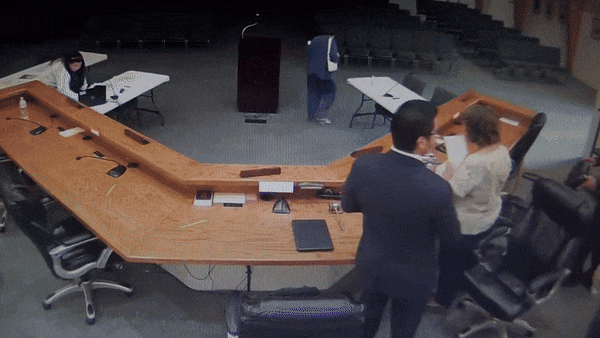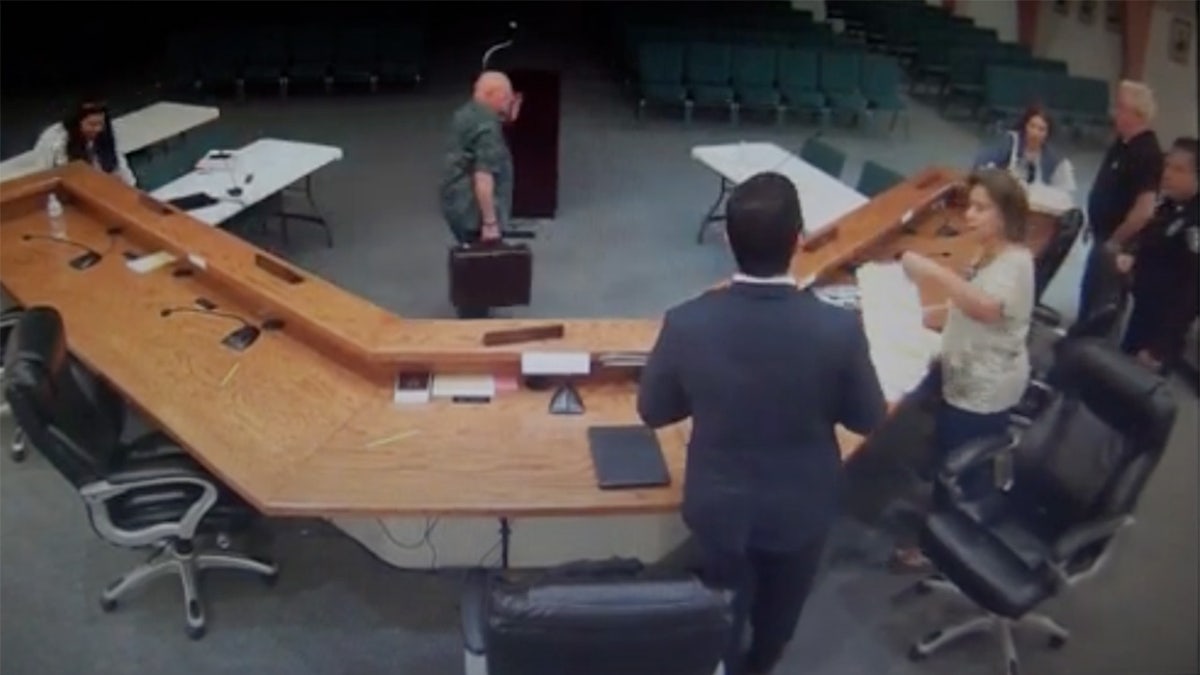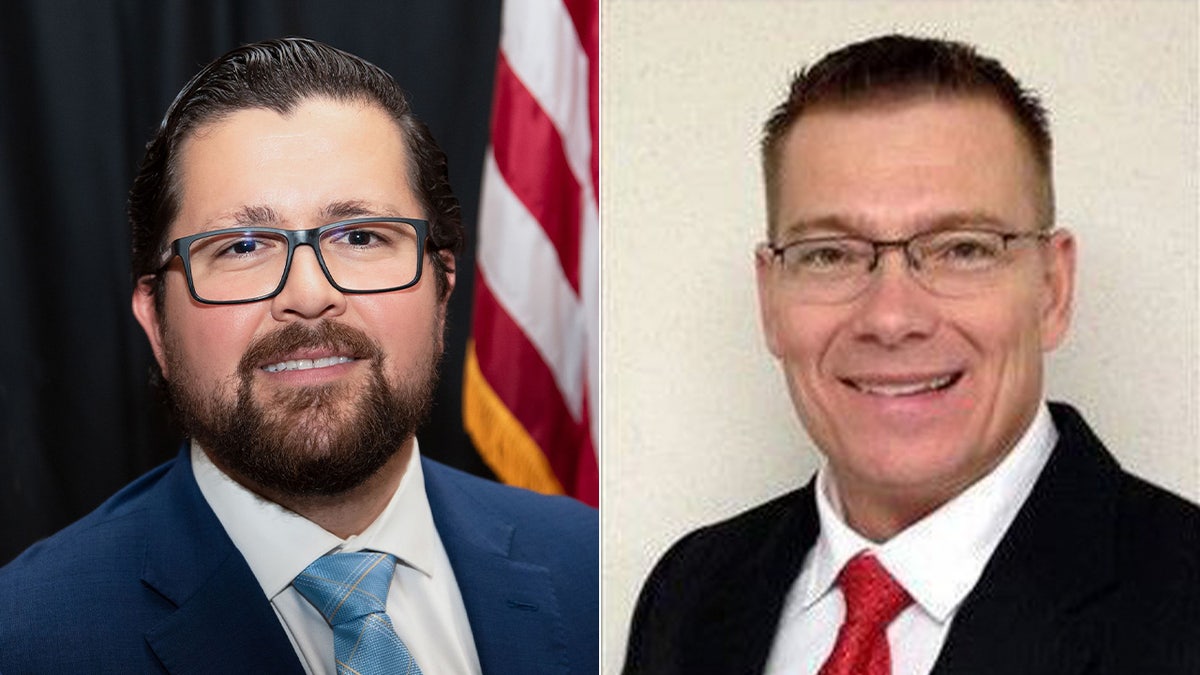Texas
Texas grandmother thrown in jail after criticizing local government. Now her case heads to the Supreme Court

A small town political feud that wound up with a Texas city council member behind bars is headed to the Supreme Court this week, where justices will consider whether the councilwoman can sue city leaders for politically motivated retaliation.
“I would never believe that I would be going to the Supreme Court,” Sylvia Gonzalez told Fox News. “I would never believe that I was in jail, either.”
Castle Hills police arrested Sylvia Gonzalez in July 2019 on a charge of tampering with a public document. Now, the Supreme Court will decide whether the grandmother and former city councilwoman can sue city officials for politically-motivated retaliation. (Courtesy Institute for Justice)
CANCER SURVIVOR DEALT NEW BLOW AFTER TEXAS POLICE DESTROYED HER HOUSE, BUT LAWYERS SAY CITY STILL HAS TO PAY
Gonzalez and her attorneys at the nonprofit Institute for Justice are suing Castle Hills Mayor JR Trevino and other officials, alleging they plotted to remove her from office as retaliation for criticizing the city manager, thereby violating her First Amendment rights.
“In America, we don’t arrest our critics,” IJ attorney Anya Bidwell said.
Gonzalez’s story began in 2019, when the then-72-year-old retiree won a seat on the Castle Hills City Council. She said constituents had complained extensively that city manager Ryan Rapelye was unresponsive, particularly to their concerns over the condition of their streets.
In America, we don’t arrest our critics.
As soon as she was elected, Gonzalez championed a non-binding petition calling for the city manager to be replaced with a previous manager citizens felt had done a better job. Another resident introduced the petition at Gonzalez’s first city council meeting. Discussion of the manager’s job performance “grew contentious,” according to court records, and the meeting was extended through the following day.
At the end of the meeting, Gonzalez said she straightened up the papers strewn across her dais and put them in her binder before going to talk to a constituent.
A police officer interrupted the conversation, telling Gonzalez that Trevino wanted to speak with her, according to court documents. Gonzalez went back to the dais and Trevino asked where the petition was. Gonzalez said she didn’t know. Trevino allegedly asked her to look in her binder, saying he could see a clip inside.

Security video from May 22, 2019, shows then-Councilwoman Sylvia Gonzalez pulling the petition out of her binder at the request of Mayor JR Trevino and a police officer. The non-binding petition called for the reinstatement of a former city manager, who Gonzalez and supporters said was more reliable and dedicated to completing street repairs than her successors. (Screenshot via City of Castle Hills Texas/YouTube)
MOMS SUE STATE OVER ‘CREEPY’ BABY BLOOD DATABASE, PRIVACY CONCERNS
Indeed, the petition was in the binder, so Gonzalez handed it over and thought nothing of it. But two months later, she learned from a neighbor that there was a warrant out for her arrest.
“I didn’t even know what I was accused of,” Gonzalez told Fox News. “I’d never been in jail … and it was very scary to an old lady like me.”
Trevino and police chief John Siemens used the briefly displaced petition to launch a criminal investigation into Gonzalez, her lawsuit claims. Three weeks into the investigation, the police chief assigned a “trusted friend and local attorney” to take over as a “special detective,” according to Gonzalez’s complaint.
The special detective produced an arrest affidavit alleging Gonzalez had “been openly antagonistic” toward the city manager from her first meeting, “wanting desperately to get him fired.” The affidavit also accused Gonzalez of misleading a woman by “telling her several fabrications” about Rapelye in order to get her signature, according to court documents.
‘THEY WANTED TO PUNISH ME’: FORMER CITY COUNCILWOMAN’S RETALIATION CASE GOES TO SUPREME COURT:
WATCH MORE FOX NEWS DIGITAL ORIGINALS HERE
Detectives found probable cause to believe Gonzalez intentionally stole the petitions, violating a Texas ban on intentionally removing or destroying government records, according to court documents from the defendants.
The statute is usually used in cases involving fake Social Security numbers, forgeries of official checks and counterfeit green cards, Bidwell said. IJ looked at 10 years of Bexar County data and couldn’t find “anything even remotely similar” to Gonzalez’s case, she added.
Rather than seek a summons for the nonviolent misdemeanor, the special detective took the unusual step of asking for an arrest warrant, the lawsuit contends. The special detective also went straight to a district court judge, circumventing the Bexar County District Attorney’s Office.
“They wanted to punish me, and they wanted to make sure I went to jail. And they did a good job,” Gonzalez said.
Gonzalez turned herself in, was handcuffed, spent the day sitting in jail and had her mugshot splashed across the evening news. Even though the DA’s office dropped the charge, her brief political career was over.

Gonzalez’s lawsuit accuses Mayor JR Trevino and former Castle Hills Police Chief John Siemens of launching a bogus investigation after she says she accidentally placed a petition she spearheaded into her binder. She was arrested for tampering with a public document, but the DA’s office later dismissed the charge. (Courtesy City of Castle Hills)
RANCHERS SAY THE STATE FLOODED THEIR LANDS, KILLING ANIMALS. THE SUPREME COURT WILL DECIDE IF TEXAS HAS TO PAY
Gonzalez sued Trevino, Siemens, special detective Alexander Wright and the city in 2020, alleging they deprived her of her rights under the First and 14th Amendments of the U.S. Constitution.
Attorneys for Trevino and the other defendants did not return a request for comment.
The city officials invoked qualified immunity, a defense commonly used to shield government officials from liability unless it can be proven that they violated a clearly established constitutional right.
They wanted to punish me, and they wanted to make sure I went to jail. And they did a good job.
A district court judge initially denied the defendants’ immunity, but the 5th U.S. Circuit Court of Appeals reversed that ruling. In a 2-1 decision, the court determined Gonzalez failed to prove her arrest was retaliatory because she could not cite cases in which other individuals had not been arrested for actions similar to hers.
The 5th Circuit cited Nieves v. Bartlett, which involved police officers making “split-second decisions,” Bidwell said. IJ hopes the Supreme Court will decide that this special protection from First Amendment lawsuits should not be extended to other government officials.
“When it comes to mayors, when it comes to other desk-bound bureaucrats who want to throw their critics in jail, First Amendment comes first, and they should be held accountable for violations of people’s constitutional rights,” Bidwell said.

Gonzalez’s lawsuit alleges Trevino and his political allies tried to have her removed from the city council in a variety of ways, including declaring that she had been improperly sworn in by the county sheriff. The 72-year-old retiree eventually resigned from the council. The city manager whose performance she criticized kept his job. (Courtesy Institute for Justice)
CLICK HERE TO GET THE FOX NEWS APP
Gonzalez will have her case heard Wednesday.
Bidwell said Gonzalez’s case could have wide-reaching implications, including in the 2023 police raid of a local newspaper office in Marion County, Kansas. The police chief was allegedly “infuriated” the newspaper was investigating his background, according to a federal lawsuit recently filed in the case.
To hear more from Gonzalez and Bidwell, click here.
Ramiro Vargas contributed to the accompanying video.

Texas
2 Sinaloa cartel leaders, including son of

Watch CBS News
Be the first to know
Get browser notifications for breaking news, live events, and exclusive reporting.
Texas
Here Are the Results of Eater Austin’s Michelin Guide Texas Reader Survey

French international dining review system Michelin is coming to Texas for the first time this year. The Michelin Guide Texas will cover Austin, San Antonio, Houston, Dallas, and Fort Worth. The company’s anonymous inspectors have already been dining out in the cities, determining which restaurants are worthy of earning coveted one, two, or three star ratings; Bib Gourmands (awarded to more affordable but still quality dining destinations); and Michelin Green Stars (given to restaurants with highly sustainable/eco-friendly practices).
Eater Austin shared our predictions for Michelin-rated restaurants in Austin last week, then we asked y’all, our dear readers, for your guesses and thoughts about the guide coming to Texas.
Of the 90 respondents, many were excited about Michelin Texas happening, echoing sentiments that it was about time it happened. One person wrote, “If it’s in Colorado, [it] should be in Texas.” (Michelin published its first Colorado guide in 2023.) Another commented that it “should have happened years ago.”
One reader sees that Michelin deeming Austin worthy of dining evaluations proves that the city’s dining scenes are worthy. “It shows that — though our service is distinctly ‘Austin,’ with warm, inviting, but casual hospitality touches — we have a passionate group of chefs and hospitality professionals that have something to say, and are serious at the table with larger cities,” they wrote. But they also caution that Austin restaurants and chefs should keep to a Texas hospitality ethos: “As long as everyone in restaurants remembers they’re here because of what we were already doing and not try to morph into service styles in New York or LA, it will benefit everyone in the industry.”
Others see Michelin’s Texas arrival as an opportunity to level up Austin’s restaurants. One wrote that “it will bring tourism, more talent, and greater level of accountability of excellence beyond local critics.” A reader said, “I hope it raises the quality of the industry in the area,” while another commented, “Honestly, [I] don’t think we need ’em, but if it helps the industry, that’s cool.”
One reader who doesn’t think that Texas restaurants are generally Michelin-worthy does think the guide is a good thing: “It will give restaurants a reason to push the envelope and not become complacent as I feel many have.”
The attention paid to Michelin-approved restaurants would benefit other restaurants and businesses. One person explained that “a high tide raises all ships.”
Some don’t think Austin is worthy of Michelin, though. One explained that, while the guide is “better for the quality level overall” for the state, “no Austin restaurants deserve any stars currently (IMO).” Many of the respondents to the survey agree with that sentiment, especially when it comes to the service components, suggesting that no restaurants would earn stars (see the rundown below). One reader wrote that only Dallas and Houston has restaurants that are Michelin quality, not Austin.
Another wrote that “if they are including service, none” would get stars, but if it was based on “pure taste, some sushi place could sneak in,” predicting that Austin would probably get a “token one star.”
Others are concerned that the arrival of such a huge dining guide in Texas could impact Austin negatively. A reader wrote, “I’m somewhat excited, but also nervous how it might change the Austin dining scene and raise prices even more.” Another bluntly put it: “Shouldn’t have happened. Michelin ruins the culinary scene and experience!” Others worry about increasing prices and harder-to-get reservations.
Still, many agree that Austin will get many Bib Gourmands and recommended restaurant designations. Below are Eater Austin readers’ Michelin top Michelin predictions for Austin, ranked.
One Michelin Star in Austin predictions
- None
- Barley Swine
- Franklin Barbecue
- Jeffrey’s
- Hestia/Uchi [tie]
Two Michelin Star in Austin predictions
- None
- Otoko
- Hestia
- Uchi
- Birdie’s/Emmer & Rye/Jeffrey’s/Olamaie (tie)
Three Michelin Star in Austin predictions
- None
- Uchi
- Jeffrey’s
- Barley Swine
- Canje
Bib Gourmand in Austin predictions
- Nixta Taqueria
- Franklin Barbecue
- Birdie’s/Canje/Odd Duck (tie)
- Foreign & Domestic/Interstellar BBQ/Loro/Ramen del Barrio/Suerte/Uchiko (tie)
- Bufalina/Cuantos Tacos/Dai Due/Discada/Emmer & Rye/Este/Hestia/Jeffrey’s/Justine’s/La Barbecue/Launderette/Lenoir/Matt’s El Rancho/Perla’s/Sammie’s/Uchi/Underdog (tie)
Michelin Green Star in Austin predictions
- Dai Due
- Emmer & Rye
- Odd Duck
- Fabrik
- Barley Swine/Canje/Intero/L’Oca d’Oro/Nixta Taqueria/Olamaie (tie)
Michelin Recommended in Austin predictions
- Emmer & Rye/Franklin Barbecue/Suerte (tie)
- Birdie’s/Odd Duck (tie)
- Canje/Este/Intero/La Barbecue (tie)
Texas
Mexican drug lord ‘El Mayo’ Zambada and son of ‘El Chapo’ arrested in Texas

In a major blow to the Sinaloa drug cartel, Ismael Zambada Garcia and Joaquin Guzman Lopez were detained after landing in El Paso on a private plane.
Mexican drug lord Ismael “El Mayo” Zambada Garcia and the son of his former partner, Joaquin “El Chapo” Guzman, have been arrested in El Paso, Texas, in a major coup for United States law enforcement that may also reshape the Mexican criminal landscape.
Zambada Garcia, who is believed to be in his 70s, and Joaquin Guzman Lopez, who is in his 30s, were detained after landing in a private plane in El Paso, two US officials told the Reuters news agency.
“The Justice Department has taken into custody two additional alleged leaders of the Sinaloa Cartel, one of the most violent and powerful drug trafficking organisations in the world,” the US Department of Justice said on Thursday.
Known by this underworld name El Mayo, Zambada Garcia is alleged to be one of the most consequential drug traffickers in Mexico’s history. He co-founded the Sinaloa cartel with El Chapo, who was extradited to the US in 2017 and is serving a life sentence in a maximum security prison.
Zambada Garcia and the younger Guzman face multiple charges in the US for allegedly funnelling huge quantities of drugs to the US, including fentanyl, which has surged in use to become the leading cause of death for Americans between the ages of 18 and 45.
Guzman Lopez is one of four sons of El Chapo – known collectively as Los Chapitos – who inherited their father’s faction of the Sinaloa cartel. His brother, Ovidio Guzman, was arrested last year and extradited to the US.
The US Justice Department had been offering $15m for information leading to the capture of Zambada Garcia, who US law enforcement claims became the Sinaloa cartel’s “unquestioned senior leader” following El Chapo’s arrest.
Attorney General Merrick B. Garland Statement on Arrests of Alleged Leaders of the Sinaloa Cartel Ismael Zambada Garcia (El Mayo) and Joaquin Guzman Lopez
🔗: https://t.co/LumvDMKx2F pic.twitter.com/Wcm20MLrhC
— U.S. Department of Justice (@TheJusticeDept) July 26, 2024
El Mayo and El Chapo’s sons: Two different styles
Zambada Garcia and Guzman Lopez face multiple charges “for heading the Cartel’s criminal operations, including its deadly fentanyl manufacturing and trafficking networks”, US Attorney General Merrick Garland said in a statement.
“We will not rest until every single cartel leader, member, and associate responsible for poisoning our communities is held accountable,” Garland said.
The Sinaloa cartel traffics drugs to more than 50 countries around the globe and is one of two most powerful organised crime groups in Mexico, according to US authorities.
But Zambada Garcia and El Chapo’s sons belong to two different generations of drug traffickers, with differing styles.
Zambada Garcia is known for being “old-school”, avoiding the limelight and operating in the shadows. El Chapo’s sons, by contrast, have a reputation for being flashy drug traffickers who courted attention as they ascended the ranks of the cartel.
El Chapo’s sons are also known to be more violent and hot-headed than Zambada Garcia, who had a reputation as a shrewd operator.
Previous arrests of important Mexican cartel leaders have triggered violence as power vacuums open, leading to significant infighting within criminal organisations and between them and their rival cartels.
Vanda Felbab-Brown, a researcher at Washington’s Brookings Institution who closely monitors Mexican security, said the potential for violence as a result of the arrests “certainly looms very large”.
-

 World1 week ago
World1 week agoOne dead after car crashes into restaurant in Paris
-

 Midwest1 week ago
Midwest1 week agoMichigan rep posts video response to Stephen Colbert's joke about his RNC speech: 'Touché'
-

 News1 week ago
News1 week agoVideo: Young Republicans on Why Their Party Isn’t Reaching Gen Z (And What They Can Do About It)
-

 Movie Reviews1 week ago
Movie Reviews1 week agoMovie Review: A new generation drives into the storm in rousing ‘Twisters’
-

 News1 week ago
News1 week agoIn Milwaukee, Black Voters Struggle to Find a Home With Either Party
-

 Politics1 week ago
Politics1 week agoFox News Politics: The Call is Coming from Inside the House
-

 News1 week ago
News1 week agoVideo: J.D. Vance Accepts Vice-Presidential Nomination
-

 World1 week ago
World1 week agoTrump to take RNC stage for first speech since assassination attempt















